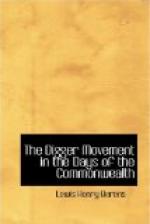[150:1] British Museum, under Wellingborrow, Press Mark, S. Sh. fol. 669 f., 15 (21).
[153:1] British Museum, Press Mark, S. Sh. fol. 669 f., 15 (23).
[161:1] There is no copy of this pamphlet at the British Museum, nor in the Bodleian; but a copy is to be found in the Dyce and Forster Library, South Kensington Museum, London, W.
CHAPTER XIV
GERRARD WINSTANLEY’S UTOPIA: THE LAW OF FREEDOM
“And
when reason’s voice,
Loud as the voice of nature,
shall have waked
The nations; and mankind perceives
that vice
Is discord, war and misery;
that virtue
Is peace, and happiness and
harmony;
When man’s maturer nature
shall disdain
The playthings of its childhood;—kingly
glare
Will lose its power to dazzle;
its authority
Will silently pass by; the
gorgeous{7} throne
Shall stand unnoticed in the
regal hall,
Fast falling to decay; whilst
falsehood’s trade
Shall be as hateful and unprofitable
As that of truth is now.”—SHELLEY.
The above words of Shelley might have been written purposely to serve as a preface to Winstanley’s final work, the main contents of which we now propose to lay before our readers. It happened to be the first of Winstanley’s works that fell into our hands, when, many years since, in consequence of Carlyle’s somewhat patronising reference to them, we first determined to ascertain what the views and aims of the Diggers really were. Its perusal{8} convinced us, and our subsequent investigations have only served to strengthen the belief, that Winstanley was, in truth, one of the most courageous, far-seeing and philosophic preachers of social righteousness that England has given to the world. And yet how unequally Fame bestows her rewards. More’s Utopia has secured its author a world-wide renown; it is spoken of, even if not read, in every civilised country in the world. Gerrard Winstanley’s Utopia is unknown even to his own countrymen. Yet let any impartial student compare the ideal society conceived by Sir Thomas More—a society based upon slavery, and extended by wars carried on by hireling, mercenary soldiers—with the simple, peaceful, rational and practical social ideal pictured by Gerrard Winstanley, and it is to the latter that he will be forced to assign the laurel crown.
From internal evidence we gather that the book was written some time before it was published. Winstanley had come to realise that the real power of the Country was in the hands of the Army, of its trusted officers and leaders. Hence it is, probably, that the opening epistle is addressed to Oliver Cromwell, who at the time was Commander in Chief of the Army, and the man to whom all England was looking with wonder and admiration, not unmixed with anxious forebodings. The years that had elapsed between the conception and the publication




